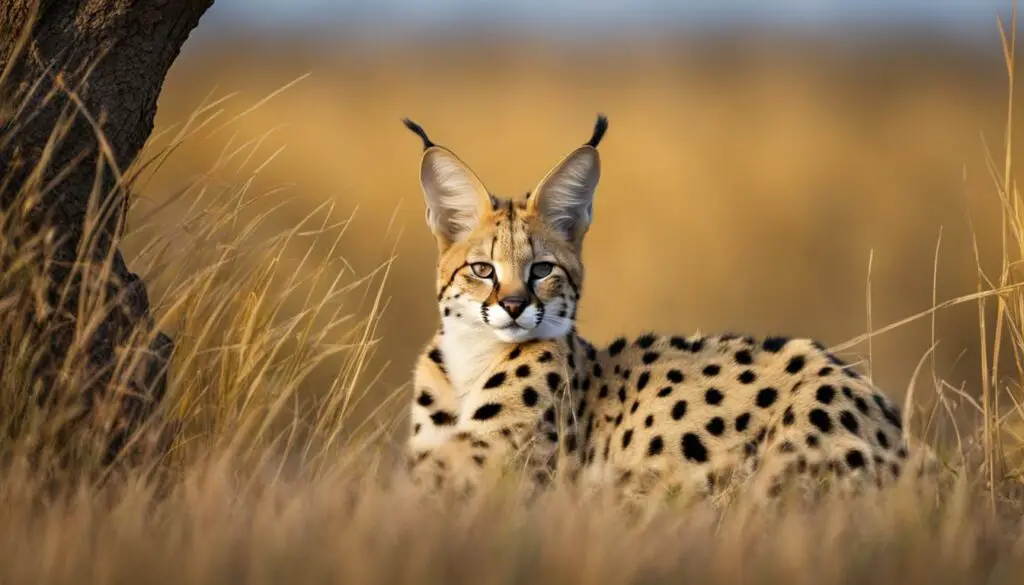Are you considering a serval cat as a pet? While these exotic and beautiful felines might be captivating, it’s essential to understand what you’re getting into before bringing one into your home. Serval cats are not suitable as family pets due to their specific needs and wild nature. Before considering ownership, it’s important to check the legality of owning a serval cat in your state.
Key Takeaways:
- Serval cats are not suitable as family pets due to their specific needs and wild nature.
- It’s important to check the legality of owning a serval cat in your state before considering ownership.
- Serval cats resemble miniature leopards with their distinctive spotted coats, long legs, and amber eyes.
- They require vast living spaces and a warm climate in order to thrive.
- Serval cats are not typically friendly or affectionate and may not be compatible with households that have children or other pets.
Personality and Physical Characteristics of Serval Cats
When it comes to serval cats, their distinctive personality and physical characteristics set them apart from other feline companions. These exotic cats are known for their independent and aloof nature. Unlike domestic cats, servals do not seek constant attention or affection from their owners. Instead, they prefer to observe and explore their surroundings, showcasing their intelligence and curiosity.
One of the most striking features of serval cats is their physical appearance. With their long legs, slender bodies, and captivating amber eyes, they resemble miniature leopards. The serval’s coat is adorned with beautiful spots, providing a natural camouflage in their native sub-Saharan African habitats. These physical attributes make servals truly captivating and unique.
When it comes to size, serval cats fall within a weight range of 20 to 40 pounds, making them larger than the average domestic cat. Their athleticism is another notable trait, allowing them to leap and pounce with precision and agility. With a lifespan of approximately 20 years in captivity, servals require long-term commitment and specialized care to ensure their well-being.
Personality and Physical Characteristics of Serval Cats:
| Personality Traits | Physical Characteristics |
|---|---|
| Independent | Long legs |
| Aloof | Slender bodies |
| Intelligent | Captivating amber eyes |
| Athletic | Distinctive spots on their coat |
| Weight: 20 to 40 pounds |
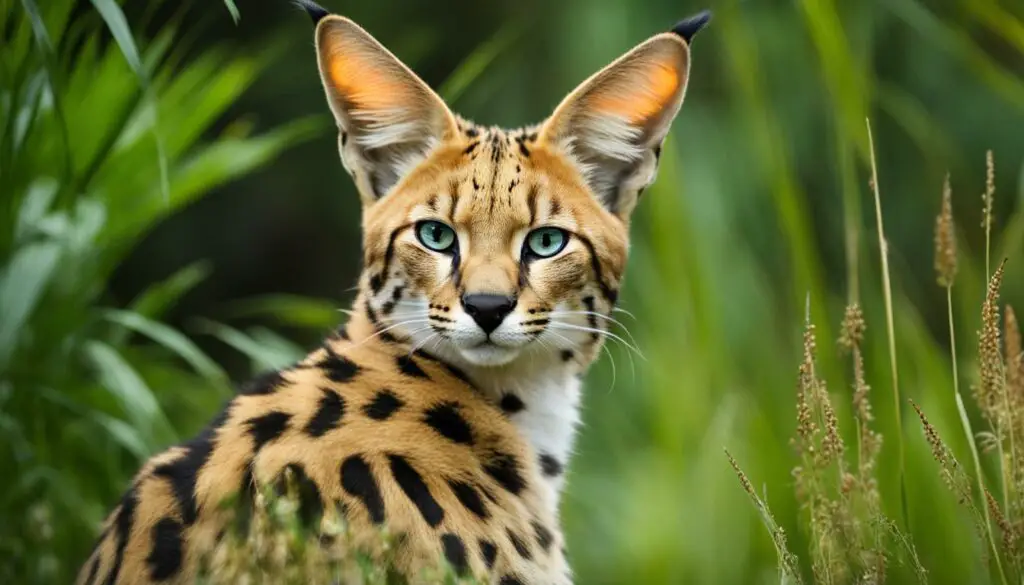
The serval’s independent and aloof nature, combined with their striking physical appearance, makes them truly fascinating creatures. Their intelligence and athleticism add to their unique charm, making serval cats a captivating choice for those looking for an exotic feline companion.
Habitat and Diet Requirements
Serval cats are wild predators that require specific habitat conditions and a specialized diet to thrive. Understanding their needs is crucial for their well-being in captivity.
Habitat Requirements
The natural habitat of serval cats is the open grasslands and wetlands of sub-Saharan Africa. In captivity, they require large, secure outdoor enclosures that mimic their natural environment. The enclosure should be fenced on all sides, including the top, to prevent escape and protect them from external threats.
Serval cats are highly active and love to jump, so the enclosure should have ample vertical space and structures for climbing and jumping. Additionally, providing hiding spots such as tall grass or bushes will help satisfy their natural instincts for stealth and camouflage.
Diet Requirements
The diet of serval cats in the wild consists mainly of small prey, such as rodents, rabbits, birds, fish, insects, reptiles, and frogs. In captivity, it is essential to replicate this diet to ensure their nutritional needs are met.
| Food | Portion |
|---|---|
| Raw or freshly killed prey | 80% of the diet |
| Pelleted diet | 20% of the diet |
Serval cats require a high-protein diet, so the raw or freshly killed prey should make up the majority of their meals. The pelleted diet can be used as a supplement to ensure they receive all the necessary vitamins and minerals.
It is crucial to provide a variety of animal prey to meet their nutritional needs. Feeding serval cats a balanced diet is essential for their overall health and well-being.
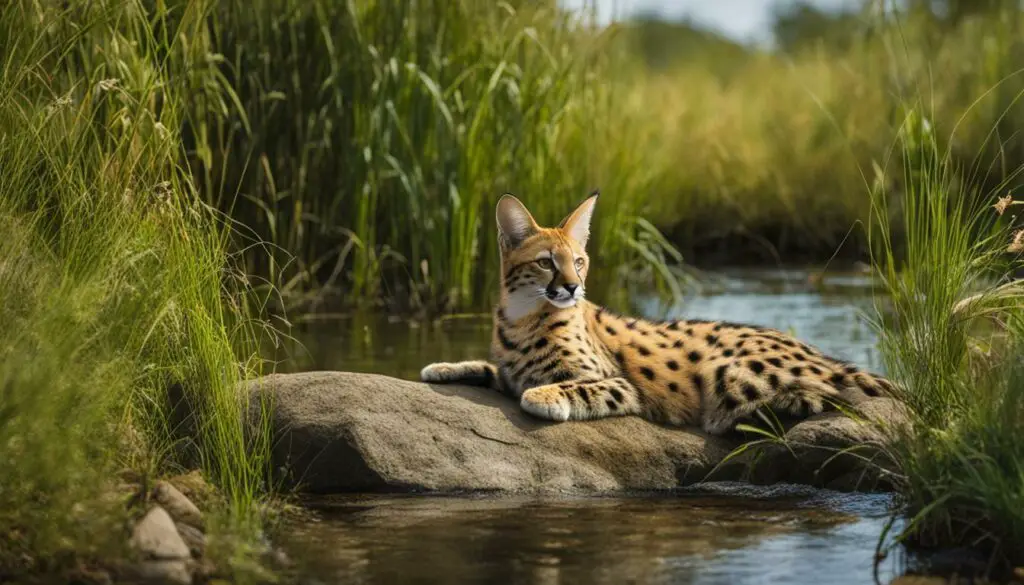
Summary
Serval cats require large outdoor enclosures that resemble their natural habitat to meet their need for space and exercise. Providing hiding spots and vertical structures will help keep them stimulated and satisfied. Their diet should consist of a combination of raw or freshly killed prey and a pelleted diet to ensure they receive all the necessary nutrients. It is essential to understand and meet these requirements to promote the physical and mental health of serval cats in captivity.
Serval Cat Behavior and Socialization
Understanding the behavior and socialization of serval cats is essential for anyone considering owning one of these exotic felines. Servals are known for their independent and aloof nature, which is a result of their wild instincts. Unlike domestic cats, servals do not typically enjoy being stroked or cuddled. They prefer to maintain their personal space and are more inclined to engage in solitary activities.
Due to their wild temperament, servals are not recommended for households with young children or other pets. Their large size and natural hunting instincts can make them potentially dangerous to smaller animals. However, servals can still form strong bonds with their owners and become emotionally attached. They may show affection in their own unique ways, such as rubbing against their owners or purring.
To ensure the well-being of a serval cat, socialization from a young age is crucial. Early exposure to different people, environments, and stimuli can help reduce their innate wariness. However, it is important to remember that servals will never fully exhibit the same level of sociability as domestic cats. They require patience and understanding, accepting that their behavior may always lean towards a more independent and aloof nature.
Challenges of Socializing Serval Cats
While servals can form attachments with their owners, it is important to note that the socialization process can be challenging. Their wild instincts make it difficult for them to fully adapt to domestic environments. Servals may display territorial behavior, indicating their need for personal space and boundaries. It is crucial to provide them with a secure and spacious outdoor enclosure where they can roam freely and fulfill their hunting instincts.
Additionally, servals have a strong prey drive and may exhibit predatory behavior towards smaller animals, including household pets. Careful supervision and separation are necessary to ensure the safety of both the serval and other animals. Consulting with a professional animal behaviorist or exotic animal veterinarian can provide valuable guidance on how to best navigate the socialization process and ensure a harmonious living environment.
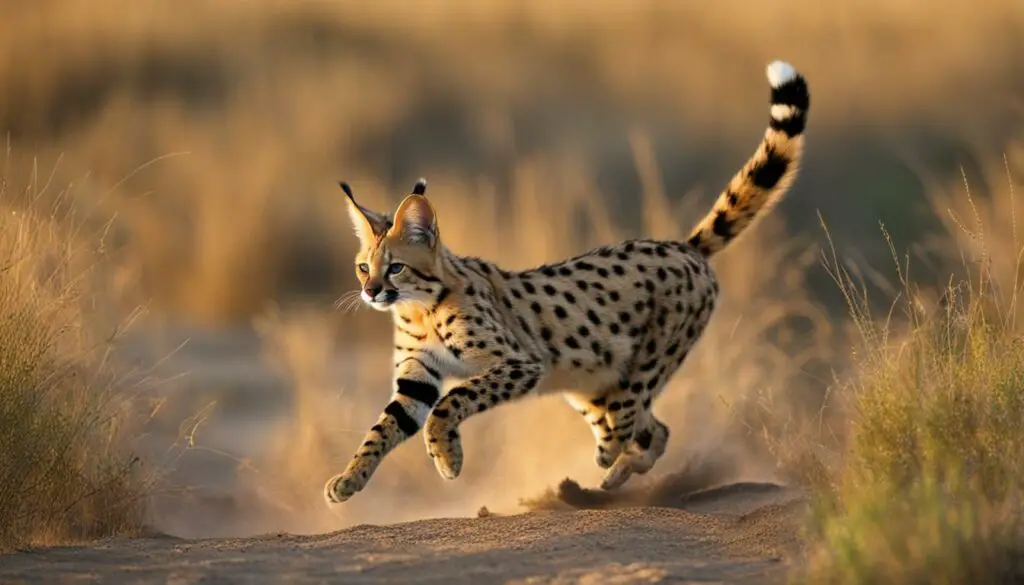
| Pros of Serval Cat Behavior | Cons of Serval Cat Behavior |
|---|---|
|
|
“While servals can form attachments with their owners, it is important to note that the socialization process can be challenging. Their wild instincts make it difficult for them to fully adapt to domestic environments.”
Servals in the Wild and Their Conservation Status
The serval cat, known for its distinctive appearance and wild nature, is a native species of sub-Saharan Africa. These beautiful cats have been a part of Africa’s ecosystem for centuries, inhabiting 35 African countries. In the wild, servals are solitary animals that establish a home territory spanning several miles. They thrive in grasslands, savannas, and wetland areas where they can hunt their prey.
Servals play an important role in their ecosystem as predators, primarily hunting live prey such as rodents, rabbits, birds, fish, insects, reptiles, and frogs. However, these remarkable cats face numerous challenges, including habitat loss and illegal hunting. As human populations expand and encroach upon their natural habitats, servals are losing their living spaces and prey sources.
Sadly, servals are listed as a species of least concern on the IUCN Red List of Threatened Species. The encroachment of human settlements and agricultural activities are major contributors to the decline of serval populations. Increased awareness and conservation efforts are crucial to protect these magnificent cats and ensure their long-term survival in the wild.
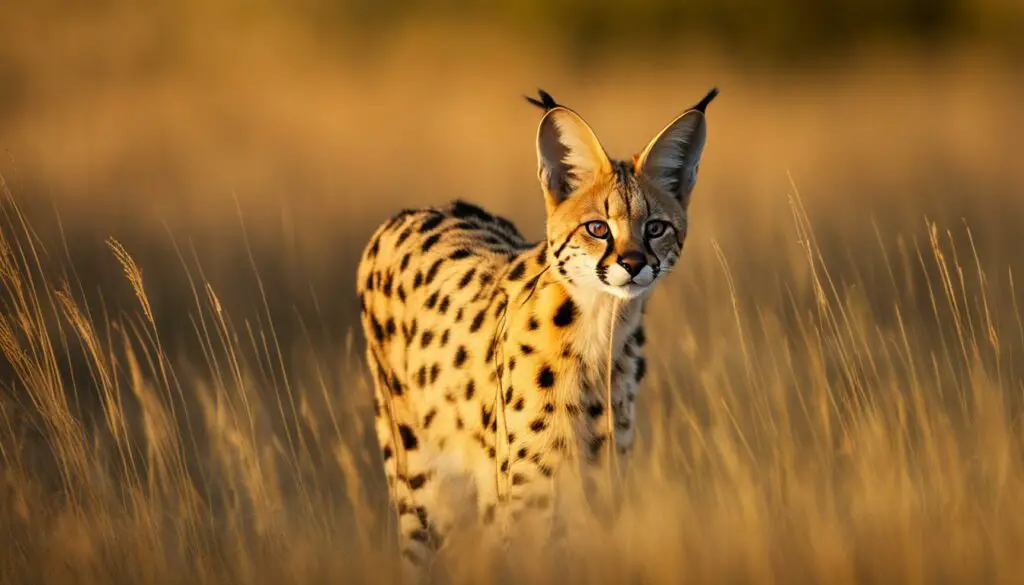
The conservation of serval cats requires a multi-faceted approach. Efforts should focus on preserving their natural habitats and implementing sustainable land management practices to mitigate habitat loss. This includes creating protected areas and wildlife corridors to allow servals to move freely between fragmented habitats. Additionally, raising awareness about the ecological importance of servals and promoting responsible ecotourism can contribute to their conservation.
| Threats to Serval Conservation | Conservation Measures |
|---|---|
| Habitat loss due to human activities | Preserving natural habitats and creating protected areas |
| Illegal hunting for their fur, bones, and body parts | Enforcing strict anti-poaching laws and increasing penalties |
| Human-wildlife conflict | Promoting coexistence through education and awareness programs |
| Climate change and loss of prey | Monitoring prey populations and implementing conservation measures |
By taking proactive steps and working together, we can help protect serval cats and ensure that future generations have the opportunity to marvel at these incredible creatures in their natural habitats.
Legalities and Ownership Restrictions
Owning a serval cat comes with significant legalities and ownership responsibilities. The wild nature and specific needs of servals require owners to understand and comply with the laws and regulations in their area. Many U.S. states have banned or restricted the ownership of serval cats due to concerns about public safety and animal welfare. Even domestically bred servals may be subject to ownership restrictions under exotic animal laws.
Before considering owning a serval, it is crucial to research the legality of ownership in your state. Contact your local animal control or wildlife agency to inquire about the regulations and requirements. Violating these laws can result in fines, confiscation of the animal, and legal consequences.
Additionally, it is essential to recognize the responsibilities that come with owning a serval. These animals have specific habitat, diet, and health needs that must be met to ensure their well-being. Providing a suitable outdoor enclosure, a varied and appropriate diet, and access to specialized veterinary care are essential aspects of responsible serval ownership.
| Ownership Responsibilities | Ownership Legalities |
|---|---|
|
|
Owning a serval cat is a serious commitment that requires responsible pet ownership. It is crucial to understand and adhere to the legalities and ownership restrictions in your area, as well as providing the appropriate care and environment for these wild animals.”
Care and Health Considerations for Serval Cats
Proper care and attention are essential when it comes to the health and well-being of serval cats. These exotic felines have specific needs that must be met to ensure their optimal physical and mental health. Here are some important considerations for caring for serval cats:
Diet and Nutrition
Servals require a carefully balanced diet to meet their nutritional needs. Their natural diet consists of live prey such as rodents, birds, and fish. In captivity, it is important to provide a variety of meats, including beef, chicken, and rabbit, to mimic their natural hunting behavior. It is also advisable to incorporate high-quality commercial cat food to ensure they receive all necessary vitamins and minerals. Freshwater should always be available to keep them hydrated.
Veterinary Care
Regular veterinary check-ups are crucial for serval cats. It is recommended to find a veterinarian with experience in treating exotic animals, as their unique physiology may require specialized knowledge. Routine vaccinations, deworming, and dental care should be part of the serval’s healthcare regimen. Regular check-ups can help detect any potential health issues early and provide appropriate treatment.
Enrichment and Exercise
Serval cats are highly active animals and require plenty of mental and physical stimulation. Providing them with a large, secure outdoor enclosure allows them to engage in natural behaviors like climbing, running, and hunting. Environmental enrichment, such as puzzle feeders and toys, can help keep them mentally stimulated. Regular play sessions with their human caregivers can also help burn off excess energy.
It is important to note that owning a serval cat is a significant responsibility and should only be undertaken by individuals with the knowledge, resources, and commitment to provide them with the care they need. Consult with experts and professionals in exotic animal care to ensure the well-being of your serval cat.
Housing and Enclosure Requirements
When it comes to housing a serval cat, a regular home is not suitable due to their large size, high activity level, and natural tendency to jump. Therefore, it is crucial to provide a large, secure outdoor enclosure that meets their specific needs. The enclosure should be fenced on all sides, including the top, as servals are known to escape by jumping or digging. Additionally, the enclosure should have sufficient space for the serval to roam, climb, and exercise.
The enclosure should also include various structures and features to keep the serval mentally stimulated and physically active. This can include platforms, perches, logs, and tunnels. Furthermore, it is recommended to provide a pool of water for drinking and swimming, as servals are known to enjoy water activities.
It is important to ensure that the enclosure is escape-proof and secure, as servals have a strong prey drive and may try to hunt animals outside the enclosure. The enclosure should also protect the serval from potential dangers and threats from other animals or humans.
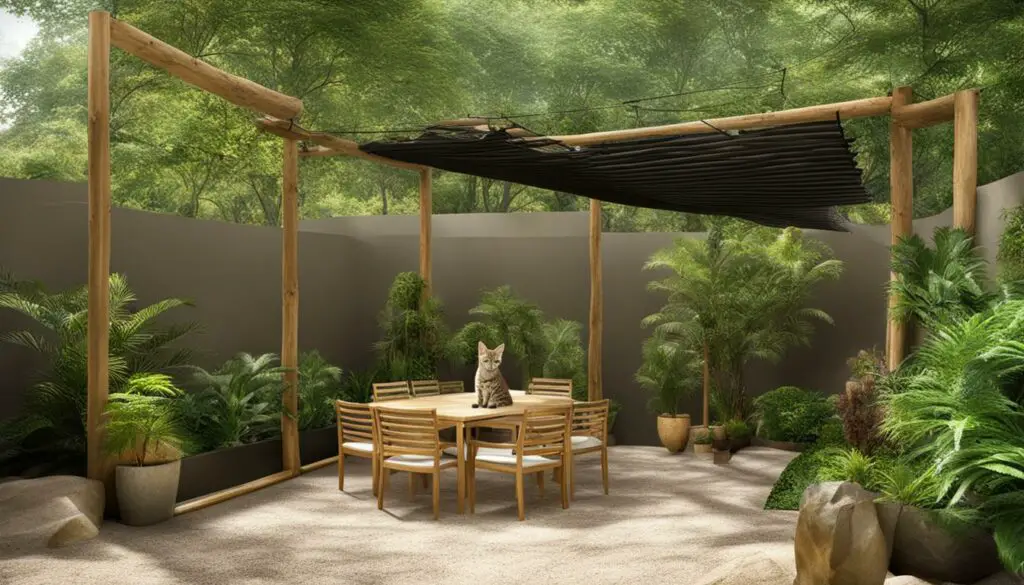
Comparison of Cat Enclosure Options
| Enclosure Type | Pros | Cons |
|---|---|---|
| Custom-built outdoor enclosure |
|
|
| Pre-made cat enclosures |
|
|
| Indoor-outdoor enclosure system |
|
|
Serval Cat Diet and Feeding Needs
Serval cats have unique dietary requirements that should mimic their natural hunting behavior. A serval’s diet should primarily consist of living or recently killed prey, such as rodents, rabbits, birds, fish, and insects. These sources of animal protein are crucial for meeting their nutritional needs and sustaining their high energy levels. Including a variety of meats, seafood, vegetables, fruits, and oils can help ensure a balanced diet for servals.
To supplement their diet, serval cats can also be fed a formulated pelleted diet specifically designed for exotic cats. These pelleted diets provide essential nutrients and vitamins that may be lacking in raw prey. However, it’s important to note that pelleted diets should not replace their natural prey entirely, as servals thrive on the physical and mental stimulation of hunting.
| Recommended Diet | Not Recommended |
|---|---|
|
|
It’s crucial to understand the dietary needs of serval cats and provide them with a nutritionally balanced diet to ensure their overall health and well-being. Consulting with a veterinarian who specializes in exotic animal care can provide valuable guidance and advice on meeting the dietary requirements of serval cats.
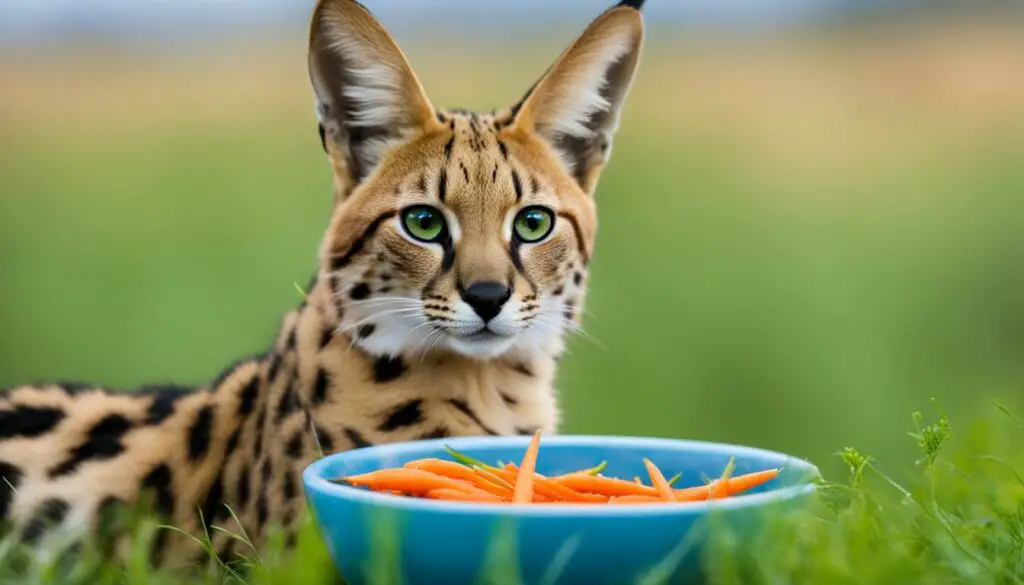
Meeting the Nutritional Needs of Serval Cats
To meet the nutritional needs of serval cats, it’s essential to offer a varied and balanced diet that includes a mix of animal proteins, fruits, vegetables, and essential oils. The feeding routine for servals should reflect their natural hunting behavior, providing opportunities for physical activity and mental stimulation. It’s important to avoid feeding servals processed human foods, dry dog or cat food, dairy products, grains, or carbohydrates, as these can lead to nutritional deficiencies and health issues. A well-planned diet, in combination with proper veterinary care and attention to their specific needs, will contribute to the overall health and happiness of serval cats as pets.
Availability and Alternatives to Serval Cats as Pets
If you’re considering a serval cat as a pet, it’s important to understand the challenges and responsibilities that come with owning an exotic and wild animal. While servals are sometimes available as pets, there are alternatives that may be more suitable for domestic life.
Alternatives to Serval Cats
One popular alternative to owning a serval cat is the Savannah cat. Savannah cats are a hybrid breed created by crossing serval cats with domestic cats. They have a similar appearance to servals, with their long legs and spotted coats, but they are generally more compatible with domestic life. Savannah cats still retain some of the wild traits of their serval ancestors, so they require specialized care and attention.
Another option to consider is adopting a domestic cat from a local shelter or rescue organization. Domestic cats make great companions and can provide the love and companionship that many people seek in a pet. Plus, by adopting a cat from a shelter, you’re giving a deserving animal a second chance at a loving home.
The Importance of Responsible Pet Ownership
Regardless of the type of cat you choose to bring into your home, it’s essential to be a responsible pet owner. This includes providing proper housing, nutrition, veterinary care, and socialization for your pet. It’s also important to understand and comply with any legal restrictions or requirements regarding cat ownership in your area.
By being a responsible pet owner, you can ensure the health and well-being of your cat and contribute to the welfare of animals in general.
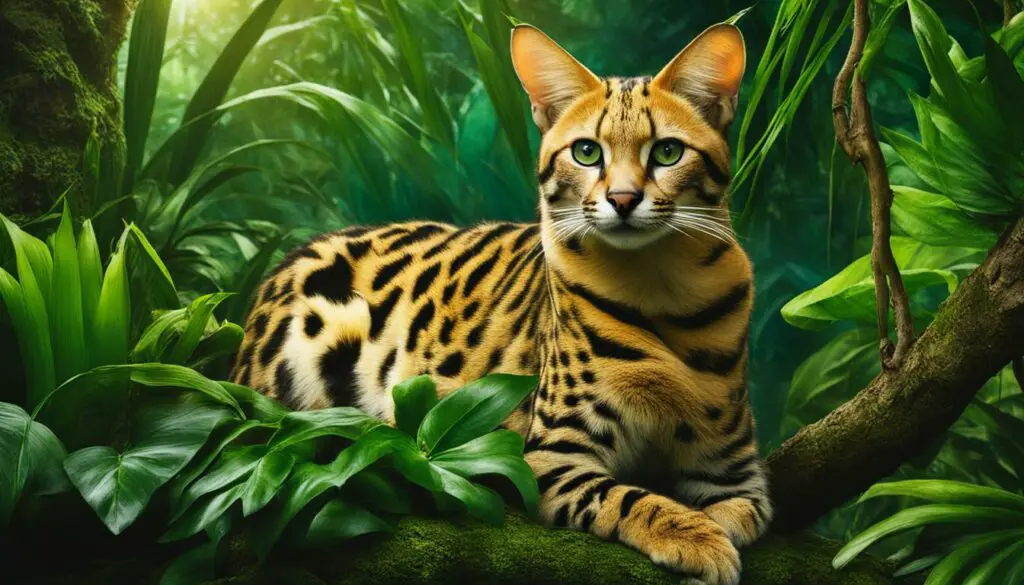
Risks and Dangers of Owning a Serval Cat
When considering owning a serval cat, it is crucial to be aware of the various risks and dangers associated with these exotic animals. Despite their captivating beauty, servals possess wild instincts that can pose challenges and potential harm to both humans and other animals. Understanding these risks is essential for responsible pet ownership.
I wanted to share my experience with owning a serval. While they are undoubtedly stunning creatures, their wild nature is not to be taken lightly. I quickly realized that their aggression towards other pets in my household was a major concern. I had to find a way to keep them separated to ensure the safety of everyone involved.
One significant risk is their potential for aggression, especially towards other pets or young children. Servals are solitary animals in the wild and are not accustomed to living in close proximity to other animals. This can result in territorial behavior and aggression towards other pets, making them unsuitable companions in multi-pet households.
Additionally, servals require specialized care and maintenance. Finding a veterinarian with experience in treating exotic animals can be challenging. Their unique dietary needs, potential for swallowing foreign objects, and susceptibility to certain health issues require extensive knowledge and expertise to ensure their well-being.
Table: Risks and Dangers of Owning a Serval Cat
| Risks | Implications |
|---|---|
| Aggression towards other pets | Potential harm to other animals in the household |
| Potential for injury | Servals can cause harm due to their size and natural predatory instincts |
| Challenges in finding appropriate veterinary care | Specialized care and knowledge required |
| Escape risk | Servals are agile and have the ability to escape enclosures |
| Legal and ethical concerns | Ownership restrictions and potential harm to wildlife conservation efforts |
Furthermore, servals possess the strength and agility to cause injury, even unintentionally. Their large size and natural predatory instincts can make interactions potentially dangerous, especially if they feel threatened or cornered.
Lastly, owning a serval cat may raise legal and ethical concerns. Many states have restrictions or outright bans on owning servals due to their wild nature and potential impact on wildlife conservation efforts. It is essential to research and understand the laws and regulations in your area before considering ownership.
Considering the risks and dangers associated with owning a serval cat, it is crucial to carefully weigh the decision and explore alternative options that are better suited for domestic environments.
Servals as Exotic Pets: Pros and Cons
Owning a serval cat as an exotic pet comes with its own set of advantages and disadvantages. Let’s take a closer look at the pros and cons of keeping these beautiful felines as pets, considering their unique characteristics and the responsibilities of cat ownership.
Pros of Owning a Serval Cat
- Unique Appearance: Servals have striking spots, long legs, and amber eyes, resembling miniature leopards. Their exotic appearance can be a major draw for those seeking a distinctive pet.
- Bonding Potential: While servals are not generally affectionate with everyone, they can form a strong bond with their primary caregiver. This bond can lead to a deep and meaningful relationship between the owner and the serval.
- Long Lifespan: Servals in captivity can live up to 20 years, providing companionship for a significant portion of their owner’s life.
Cons of Owning a Serval Cat
- Unusual Dietary Needs: Servals have specific dietary requirements, primarily consisting of live or recently killed prey. Meeting their nutritional needs can be challenging and expensive.
- Incompatibility with Children and Other Pets: Due to their wild nature and natural instincts, servals are not recommended for households with young children or other pets. Their size and potential for aggression can pose risks in a domestic environment.
- Need for a Large Outdoor Enclosure: Servals are highly active and agile. They require a large, secure outdoor enclosure to provide them with the space to roam, climb, and fulfill their natural hunting instincts.
- Legal Restrictions: The ownership of serval cats is banned or heavily regulated in many states. It is essential to research and understand the legality and restrictions in your area before considering owning a serval.
- Challenges of Veterinary Care: Finding a veterinarian with expertise in treating exotic animals, like servals, can be difficult. Their distinct medical needs and potential for ingesting foreign objects require specialized care.
Considering the pros and cons, owning a serval cat as a pet requires careful consideration and commitment to providing the necessary care and environment for these unique animals. It is important to weigh the risks and responsibilities associated with owning an exotic pet before making a decision. Alternatives like the Savannah cat, a hybrid of a serval and a domestic cat, can provide a similar appearance and temperament while being more suited to domestic life.
Remember, responsible pet ownership and the welfare of the animals should always be the top priority when considering any exotic pet.
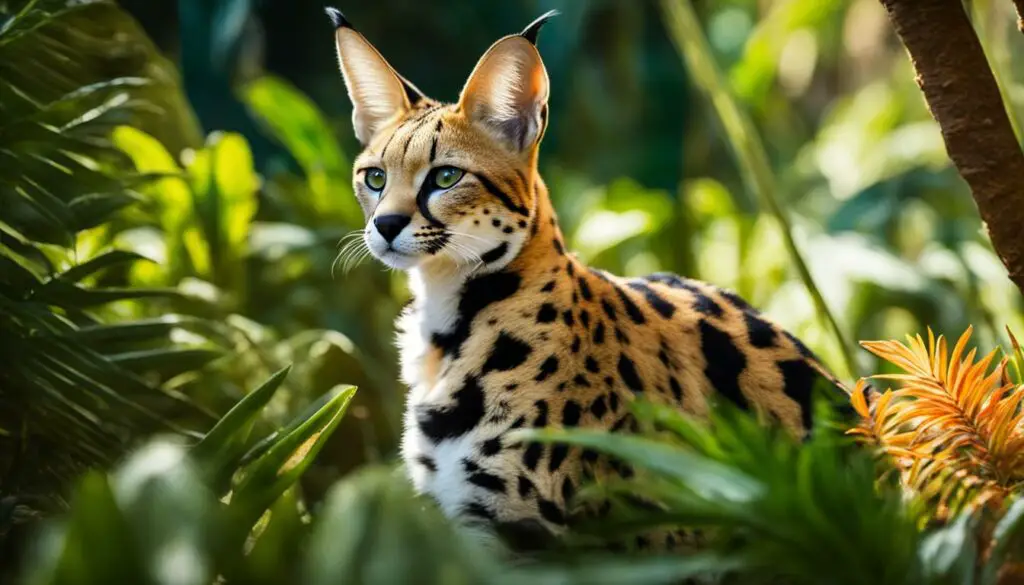
Savannah Cats as an Alternative to Serval Cats
If you’re captivated by the beauty of serval cats but know they aren’t suitable as pets, Savannah cats could be a great alternative. Savannah cats are a hybrid breed created by crossing a serval with a domestic cat. They offer a similar appearance to servals, with their striking coat patterns and long legs, but have a more manageable size and temperament for domestic life.
Like their serval ancestors, Savannah cats retain some of their wild instincts and require specialized care. However, they are typically more social and adaptable, making them better suited for families and households with other pets. Savannah cats are known to be highly intelligent, playful, and curious, providing entertainment and companionship to their owners.
While servals are banned or restricted in many areas, Savannah cats may be more widely available, but they still require responsible ownership and legal compliance. Before bringing a Savannah cat into your home, research your local laws and regulations regarding ownership and ensure you have the time, resources, and understanding to meet their unique needs.
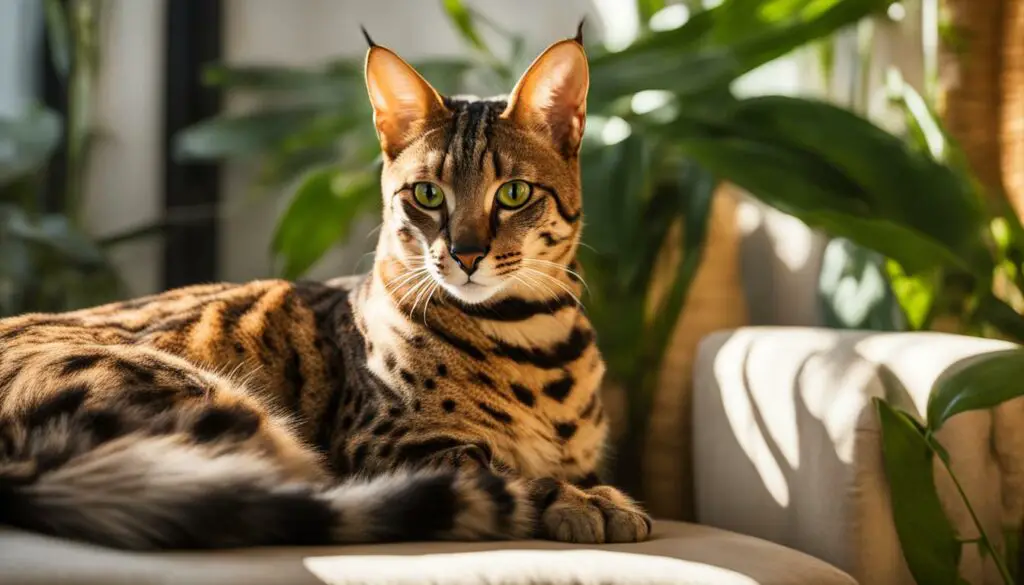
| Comparison | Serval Cats | Savannah Cats |
|---|---|---|
| Size | Larger, weighing 20 to 40 pounds | Varying sizes, but typically smaller than servals |
| Behavior | Independent, aloof, not typically affectionate | Social, curious, playful |
| Legal Restrictions | Banned or restricted in many areas | Vary depending on location |
| Suitability as Pets | Not recommended for most households | More suitable for families and households with other pets |
Conclusion
Savannah cats offer a captivating alternative to owning a serval cat. They possess the exotic appearance and some of the characteristics of servals, while being more manageable and suitable for domestic life. However, they still require responsible ownership, including understanding and meeting their unique needs, and complying with local laws. Consider consulting with a reputable breeder or rescue organization to learn more about Savannah cats and determine if they are the right fit for you.
The Importance of Responsible Pet Ownership
Owning a pet, whether it’s a cat, dog, or any other animal, is a significant responsibility. It’s important to recognize that owning a serval cat or any exotic animal requires even more care and attention. Responsible pet ownership extends beyond meeting basic needs like food and shelter; it encompasses providing an environment that promotes their physical and mental well-being.
When it comes to cat ownership responsibilities, it’s crucial to understand the specific needs of the animal. Servals, for example, require large, secure outdoor enclosures that mimic their natural habitat. They need ample space to roam and exercise their hunting instincts. Additionally, servals have unique dietary requirements that include live prey, such as rodents and birds. Providing a varied and appropriate diet is essential for their health and happiness.
Another important aspect of responsible pet ownership is ensuring access to proper veterinary care. Exotic animals like servals often require specialized care from veterinarians with experience in treating these species. Regular check-ups, immunizations, and preventive care are vital to maintaining their well-being. It’s crucial to find a veterinarian who is knowledgeable about exotic animals and can provide the necessary care and treatment.
| Responsibilities | Considerations |
|---|---|
| Providing a suitable habitat | Secure outdoor enclosure, environmental enrichment |
| Meeting dietary needs | Variety of live prey and formulated diet |
| Access to specialized veterinary care | Veterinarians experienced in exotic animal care |
| Socialization and mental stimulation | Interaction, play, and environmental enrichment |
| Compliance with legal restrictions | Research and adhere to local and state laws |
| Educating oneself about the species | Understanding behavior, needs, and potential challenges |
In addition to meeting the physical needs of a serval cat, responsible pet ownership also involves providing socialization and mental stimulation. Although servals are naturally aloof, they can form strong bonds with a single person. Spending quality time with the animal, engaging in interactive play, and providing environmental enrichment are necessary for their overall well-being.
Lastly, responsible pet ownership entails compliance with legal restrictions. It is important to research and understand the laws and regulations regarding the ownership of exotic animals in your area. Violating these laws can lead to legal and ethical consequences, as well as potential harm to the animal.
By recognizing and fulfilling these responsibilities, we can ensure the welfare and happiness of our beloved pets while also respecting the unique needs of exotic animals like serval cats. Responsible pet ownership is a commitment, but the rewards of providing a loving and suitable home for these magnificent creatures are immeasurable.
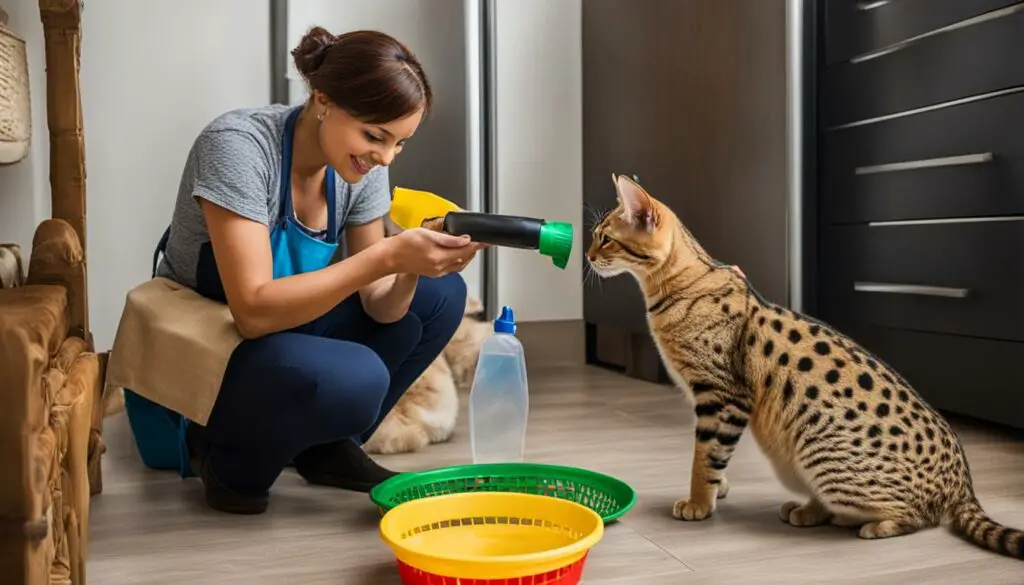
Serval Cat Pet: What You Need To Know
Exotic cats have always held a certain allure, and one fascinating species that often comes to mind is the serval cat. With their unique appearance and wild nature, servals may seem like an exciting choice for a pet. However, it’s important to understand that servals are not suitable as household pets. Their specific needs and wild instincts make them a challenging choice for most individuals or families.
Servals are independent and aloof creatures, known for their athleticism and distinctive spotted coats. However, their natural behavior and size make them unsuitable for households with children or other pets. Additionally, servals require vast living spaces and a warm climate, making a large, secure outdoor enclosure a necessity. It’s worth noting that servals cannot be fully domesticated and still retain their wild instincts, even when bred in captivity.
Before considering owning a serval cat, it’s crucial to research the legalities in your area. Many U.S. states have banned or significantly restricted ownership of servals due to their wild nature. Furthermore, finding a veterinarian with expertise in exotic animals can be challenging, as servals require specialized care and may have unique health issues.
While servals may be captivating, it’s important to prioritize the welfare of these animals and consider alternative options such as the Savannah cat, a hybrid breed that shares the serval’s appearance but is more suitable for domestic life. Additionally, adopting a domestic cat from a local shelter can provide companionship without the challenges associated with owning an exotic animal.
FAQ
Is it legal to own a serval cat as a pet?
The legality of owning a serval cat as a pet varies depending on the state. It is important to research and understand the laws and regulations in your area before considering ownership.
Are serval cats suitable for families with children or other pets?
No, serval cats are not recommended for households with young children or other pets due to their wild instincts and potential for aggression.
Are serval cats friendly and affectionate?
Servals are naturally aloof and do not enjoy being stroked or cuddled. They are not typically friendly or affectionate cats.
What do serval cats eat?
In the wild, servals primarily hunt live prey such as rodents, rabbits, birds, fish, insects, reptiles, and frogs. In captivity, they require a diet that mimics their natural hunting behavior, consisting of a variety of animal prey.
Can serval cats be kept indoors like domestic cats?
No, serval cats cannot be kept inside a regular home due to their large size, high activity level, and tendency to jump. They require a large, secure outdoor enclosure.
What is the lifespan of a serval cat?
Servals have a lifespan of around 20 years in captivity.
Can serval cats be declawed?
Declawing is not recommended for serval cats as it can cause pain and vulnerability in confrontations with other animals.
Are serval cats fully domesticated?
No, even when bred in captivity, serval cats are not fully domesticated. They retain their wild nature and specific needs.
Where are serval cats found in the wild?
Servals are found in 35 African countries and are native to sub-Saharan Africa.
Can serval cats bond with humans?
Servals can bond well with one person and may become emotionally attached.
What are the risks and dangers of owning a serval cat?
Owning a serval cat comes with various risks, including their potential for aggression, their ability to escape enclosures, and the legal and ethical issues surrounding their markings.
Are there alternatives to owning a serval cat?
Yes, the Savannah cat, which is a hybrid of a serval and a domestic cat, can provide a similar appearance and temperament while being more suitable for domestic life.
How can I ensure responsible pet ownership of a serval cat or any exotic animal?
Responsible pet ownership includes researching and understanding the specific needs, legal requirements, and potential challenges associated with owning an exotic animal. Providing appropriate housing, nutrition, veterinary care, and socialization is crucial for the welfare of these unique animals.

